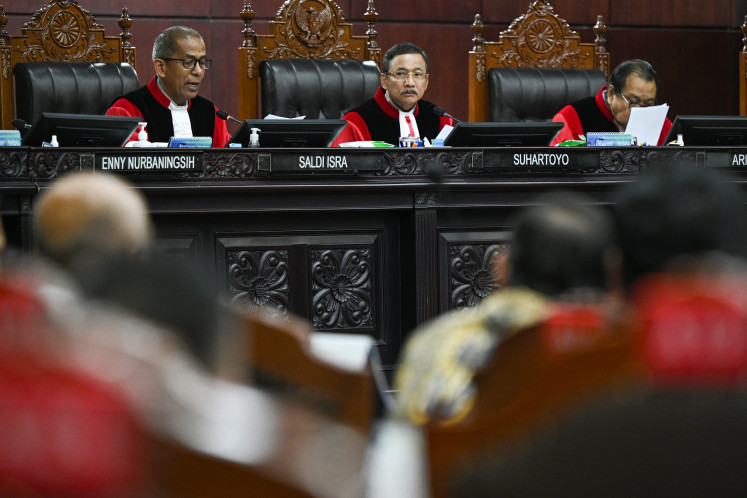Popular Reads
Top Results
Can't find what you're looking for?
View all search resultsPopular Reads
Top Results
Can't find what you're looking for?
View all search resultsDoctors, activists call for e-cigarette ban
Pulmonologist Agus Dwi Susanto recalls treating a patient who was complaining of chest pains and shortness of breath after smoking e-cigarettes for six months
Change text size
Gift Premium Articles
to Anyone
P
ulmonologist Agus Dwi Susanto recalls treating a patient who was complaining of chest pains and shortness of breath after smoking e-cigarettes for six months.
The patient was diagnosed with pneumothorax, a collapse of the lung that occurs when air leaks into the space between the lung and chest.
The diagnosis was one of many that directed Agus’ attention to the surging popularity of e-cigarettes among Indonesians, with many assuming that it is less harmful than conventional cigarettes.
“The nicotine levels in an e-cigarette smoker’s urine is similar to those of someone who smokes five [conventional] cigarettes a day, around 223 milligrams,” said Agus, who also heads to Indonesian Pulmonologists Association (PDPI).
The PDPI, the Indonesian Pediatrician Association (IDAI), the Indonesian Cardiologist Association (PERKI) and several other medical associations voiced their concerns over the effects of e-cigarettes on people’s health in a press conference held at the Health Ministry in Jakarta on Jan. 15.
The associations, along with tobacco control activists, called on the government to ban e-cigarettes in Indonesia.
With more and more minimarts and online stores starting to sell e-cigarettes, these so-called alternatives to tobacco have become more popular among young Indonesians, especially teenagers, according to the 2018 Basic Health Survey (Riskesdas).
The prevalence of e-cigarette smoking among Indonesians aged 10 to 18 was at 10.9 percent in 2018, skyrocketing from 1.2 percent in 2016.
The rate is even higher than for conventional cigarettes, which stood at 9.1 percent in 2018.
Dr. Widyastuti Soerojo from the National Commission on Tobacco Control accused e-cigarette companies of falsely marketing their products as smoking cessation devices.
“What really happens is ‘double use’. Our youngsters are now smoking both conventional cigarettes and e-cigarettes,” Widyastuti said.
She further explained that such double use could reduce the brain’s capacity to memorize and analyze in young people below the age of 20. This reduced cognitive thinking further hampers their productivity, she added.
Dr. Sally A. Nasution from the Indonesian Internists Association (PAPDI) suggested that e-cigarettes could weaken the smokers’ immune system and potentially cause complicated internal diseases.
“There are cases of blood disorders and internal diseases that would usually appear in people aged 60 and above, but somehow, it is now happening to teenagers [smoking e-cigarettes],” she said.
The Tobacco Control Support Center (TCSC) blames appealing advertisements for the product’s rising trend.
“[Brands] also offer interesting flavors and stylish packaging with a promise of a youthful lifestyle. This would certainly spur the interest of teenagers and even children. But sadly, there is no such control from the government against these advertisements,” said Dr. Sumarjati Arjoso said, chairwoman of the TCSC.
The Health Minister’s expert staff member on development and health funding, Dr. Alexander K. Ginting, welcomed the doctors’ and activists’ recommendations.
“We need to fix the common misunderstanding that [conventional] cigarettes, e-cigarettes and even non-nicotine e-cigarettes don’t have risks. The Health Ministry will keep campaigning on the dangers of smoking and push for a ban on e-cigarettes,” he said.
The Health Ministry's noninfectious disease prevention and control director, Cut Putri Arianie, said the ministry needed the support of other ministries to restrict e-cigarettes.
“Speaking of restricting e-cigarette distribution in minimarts, I believe it is the Trade Ministry’s authority to issue a regulation on that,” she said.
Previously, the Public Health Scholars Association (IAKMI) also condemned cigarette companies for introducing new forms of nicotine consumption.
According to the association, those companies claimed their new products were less harmful, tobacco-free and could save millions of lives from smoking-related diseases caused by conventional cigarettes.
As an example, IAKMI shows how tobacco giant Philip Morris International launched a foundation called a Smoke-Free World in September 2017, which reportedly encouraged people to shift to what it claimed was a better and safer alternative to smoking: e-cigarettes.
“This fact shows that cigarette companies have no intention to stop selling their conventional cigarettes. The e-cigarettes, new-generation products, are merely another way to make a profit. There is no intention to protect people’s health,” said Widyastuti Soerojo from the IAKMI.
A survey by the Jakarta Residents Forum (Fakta) found that 57 new cigarette brands were registered from 2015 to 2019, 41 of which were conventional cigarettes and 16 were e-cigarettes, of which six were heated tobacco products and 10 were electronic nicotine delivery systems. (trn)










